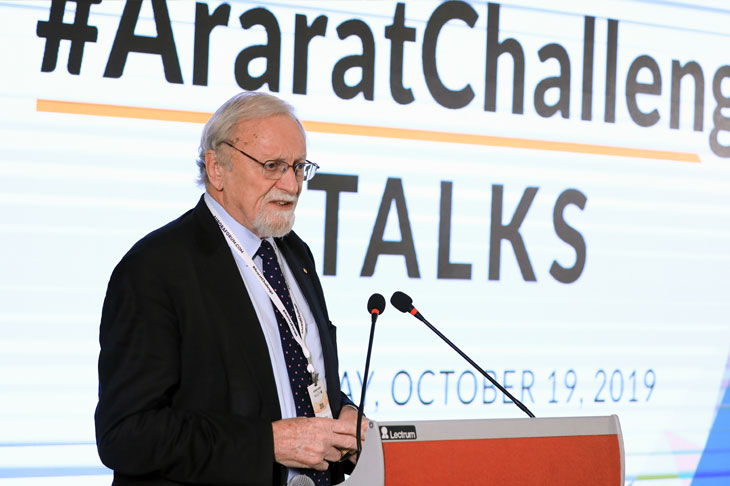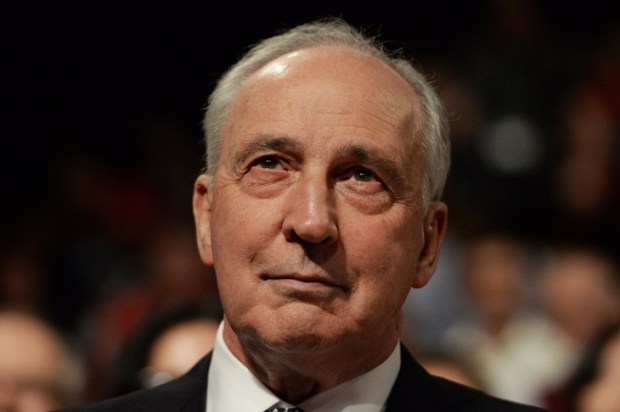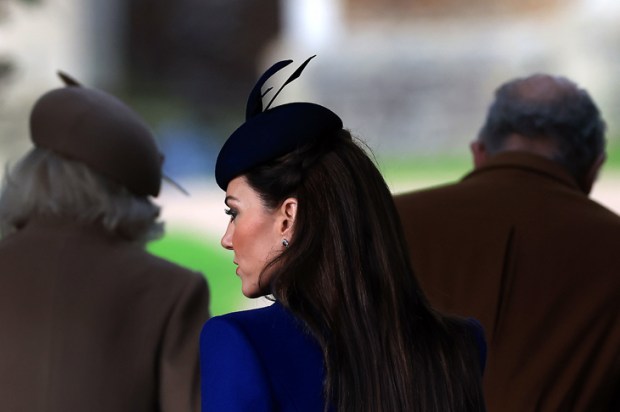When Gareth Evans was Labor’s foreign minister and Li Peng was premier of China, second in rank only to General Secretary Jiang Zemin, a joke did the rounds of Australia’s Department of Foreign Affairs and Trade. Li was a ruthless man, known as the Butcher of Beijing for his role in the Tiananmen Square massacre. At an APEC meeting, so the story goes, Li was bragging about China’s superiority. To prove his point, he undid his fly and stuck his vital member into a bucket of snapping turtles whereupon one of the reptiles promptly affixed himself to the premier’s pecker. Without so much as a wince, Li endured the agony for a minute before pulling out a lapel pin and poking the animal in the eye. Startled, the beast relinquished its grip. ‘Now,’ boasted Li, ‘who else can do that?’ The other APEC ministers looked aghast and said nothing until, finally, Gareth cleared his throat and said, ‘Okay. I’ll do it. Just don’t poke me in the eye.’
Recently, former Labor foreign minister Bob Carr and Evans have both been singing from Beijing’s Little Red Songbook. When the editor of China’s official media mouthpiece, the Global Times, referred to Australia as an irritating ‘piece of chewing gum, stuck to the sole of China’s shoe that needed to be removed with a stone’, because the government had had the temerity to call for an independent inquiry into the origins of the coronavirus, Carr leapt into print with an op-ed in the Sydney Morning Herald blaming Australia. Why? For its pathetic attempt to be America’s attack dog and instead looking like ‘a puppy rolling over to have our tummy tickled by our great ally, after being sent yapping around the yard to return with the rubber bone.’ Being backed by US Secretary of State Mike Pompeo simply confirmed the sad image that persists in Asia that Australia is happiest when playing deputy sheriff to the US, he said. Evans repeated the refrain claiming that government had ‘played right into that stereotype of Australia as the deputy sheriff to the US,’ a smear coined by the Left in 1999 to criticise Liberal prime minister John Howard for intervening to ensure a free and fair referendum on independence in East Timor.
The Australian Labor Party has a long and inglorious history of kowtowing to Mao and Maoists and cosying up to regional dictators, like Suharto in Indonesia, starting with Opposition leader Gough Whitlam’s visit to China in July 1971.
Whitlam’s historic trip came in the dark days of the Cultural Revolution as the battle to determine Mao’s successor was being waged in the murky, bloody ways that are the hallmark of dictatorships. That would not have daunted Gough. He had endorsed the recognition of China since 1954, not flinching at the Great Leap Forward which led to the deaths of millions of Chinese.
When Whitlam met with Premier Zhou Enlai, China had just put a ban on Australian wheat exports, favouring Canada, which had recognised Beijing the year before. Zhou ambushed Whitlam with a public meeting, days before a secret rendezvous with US Secretary of State Henry Kissinger, and used the occasion to attack the US for ‘wanting to control others.’ Whitlam joined in, criticising the US for sending Australian troops to Vietnam, which pleased Zhou so much that he sent Gough a birthday cake signed ‘With the compliments of the Premier.’ The only disappointed party was shadow agricultural minister Rex Patterson, as Whitlam failed to even raise the wheat ban.
Fast forward fifty years and Beijing’s playbook has hardly changed. This time it is imposing a tariff of 80 per cent on Australian barley at exactly the same time as it is allowing US barley imports into China under the terms of the hard-fought US-China trade negotiations. Australia is the world’s largest exporter of barley and China is its largest market. The trade is worth $1.5 billion in a good year and the Global Times played up China’s attempt to play Australia off against the US asking, if ‘US agricultural products take over Australia’s share in the Chinese market, then who is the antagonist of Australian businesses, China or the US?’
As if it were worried that Australia didn’t understand what was at stake, the Global Times has hammered home the message in almost daily articles. The headlines tell the story starting with ‘Tariffs on barley not the only problem Australia may face,’ progressing to ‘Potential tariffs not punishment but wake-up call to Australia,’ explaining ‘Trade talks with Australia unlikely, unnecessary at the moment,’ before becoming increasingly unhinged with headlines like, ‘Australia delusional in expecting normal trade amid tensions with China’, ‘Australia to pay heavy economic price, if acting as a US attack dog,’ and culminating on Monday with ‘China imposes anti-dumping tariffs on Australian barley.’
The Global Times — like Labor’s old China hands — must find it puzzling that PM Morrison has not rolled over, like Bob Carr’s puppy. No one in Australia underestimates the pain that China can impose on the nation, but the pandemic has also brought into sharp focus the perils of appeasement and the realisation that business as usual is no longer an option. And in this Australia is not alone.
As Trump heads toward the presidential election, the relationship with China will inevitably become a key battleground. Already, the attack lines are branding the Democrat contender as Beijing Biden. Trade advisor Peter Navarro will be pushing an agenda of decoupling from China and reshoring strategic industries, particularly the manufacture of pharmaceuticals and personal protective equipment. Other nations will look to diversify their supply chains so that they are not vulnerable to Beijing’s blackmail, and coalitions of the sort that has formed at the World Health Assembly will become more common as nations work together to avoid Chinese retribution.
Carr gloated in his oped that because Labor wasn’t kowtowing to China, playing Middle power diplomacy to the Middle Kingdom, ‘plucky little Australia’ was locked into an idea with no backing from European or Asian partners. How disappointing for him — and His Master’s Voice in Beijing — that more than 110 nations have supported Australia’s call for an independent inquiry. China’s ambassador to Canberra has tried to hide his country’s displeasure by ridiculing Australia, claiming the resolution on Covid-19 adopted by the WHA is totally different from Australia’s proposal and ‘to claim the WHA’s resolution a vindication of Australia’s call is nothing but a joke.’ Maybe. But no one is laughing. Or stepping up to play snapping turtles with Xi Jinping’s pecker.
Got something to add? Join the discussion and comment below.
Get 10 issues for just $10
Subscribe to The Spectator Australia today for the next 10 magazine issues, plus full online access, for just $10.
You might disagree with half of it, but you’ll enjoy reading all of it. Try your first month for free, then just $2 a week for the remainder of your first year.














Comments
Don't miss out
Join the conversation with other Spectator Australia readers. Subscribe to leave a comment.
SUBSCRIBEAlready a subscriber? Log in